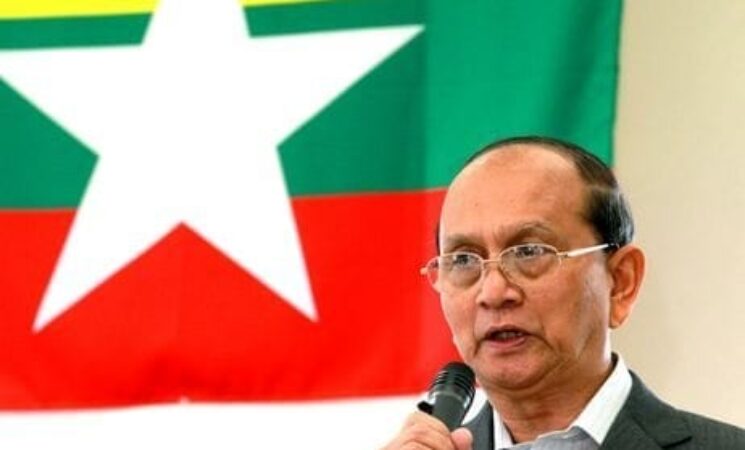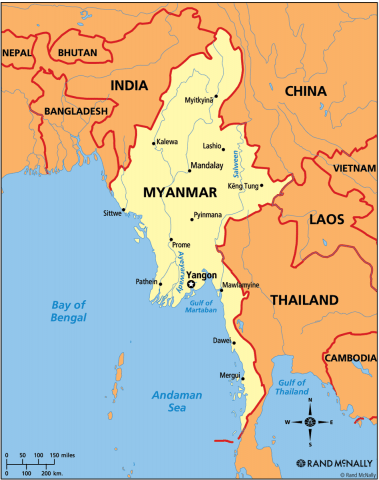In 2010, Myanmar transitioned from military rule to civilian democracy; however, the Myanmar Armed Forces still have a large say in the political affairs of the country. Today’s ruling party is made up of a number of current or former military men and the constitution guarantees 25% of parliamentary seats to army men. Not only that, the constitution states that the key three ministerial posts- interior, defense, and border affairs- must be held by serving generals. Does this level of military involvement pose a threat to the nascent democracy or, at this point in the transition; is the military a necessary evil?
At this phase of Myanmar's unique democratic transition, a role for the military may be necessary. But this is not to suggest it should be a permanent feature of the political system – that is for the military, local political elites and the citizenry to decide over time as they shape their new democracy. The larger issue at the moment is the 2015 election. If Article 59 of the constitution is not amended, Aung San Suu Kyi will not be eligible to run and thus the election will not be "free, fair and transparent" despite what President Thein Sein claims. We should expect some form of civil unrest in the run up to the election.
Burma is seen as a diplomatic success story for the Obama administration. In a speech at West Point in June 2014 Obama said “look at a country like Burma, which only a few years ago was an intractable dictatorship and hostile to the United States. We have seen political reforms opening a once-closed society… [I]f Burma succeeds we will have gained a new partner without having fired a shot.” Does US rhetoric match the reality?
There's no question that Burma has made significant strides politically – from dictatorship to a form of civilian democracy with a relatively open society. If we take a historical perspective, US rhetoric does match the reality. That said, it is no secret that such reforms are an ongoing process. Even the US government has noted this, from former President Bill Clinton to current President Barack Obama as well as senior US lawmakers. The goal is to keep up with this positive momentum as much as possible during this sensitive transition, while tackling key issues like the ongoing ethnic and sectarian conflicts.
In Myanmar, there is a clear mistrust between the Buddhist and Muslim communities, what is the situation like for the approximately 1 million Rohingya Muslims in western Myanmar? How do you see this playing out in the future?
Sadly, things will likely get worse before they get better, as the UN Human Rights Envoy for Myanmar, Yanghee Lee, recently noted. Given that there hasn't been any notable state-led effort to reduce the violence between these religious groups, it's unlikely such societal tensions (from riots to rumors) will reduce. The Burmese government's recent decision to invite aid groups back to look after Muslim minority groups like the Rohingyas might earn some short-term goodwill, but long-term strategizing is needed. A worst case scenario would see regional militant groups taking a stand beyond their rhetoric to action on Burmese soil or against Burmese embassies abroad (which has happened in Indonesia).
Recently, the United Nations and others have warned that the persecution Myanmar's Rohingya could turn into a full-scale genocide. The Burmese government is reluctant to intervene; however, the US has the unique ability to pressure the government to do so. What role can/should the US play here, if any? Do you foresee a change in US policy in the near future?
Given the current focus on global hotspots like Ukraine, Syria, Gaza, and Iraq, it is unlikely US policy will dramatically change for local conflict in Myanmar in the near future. But the US government is definitely monitoring the situation, as reflected in the recent decision to extend economic sanctions against Myanmar – for example, US President Obama in May and a senior US lawmaker in July.
Dr. Maha Hosain Aziz is a part-time professor of global politics at NYU's Graduate School of Arts & Sciences, a senior analyst at crowdsourced consultancy Wikistrat, a columnist for CNN's Global Public Square and advisory board chairwoman of Afghanistan's first university e-mentoring program (NSRG).


